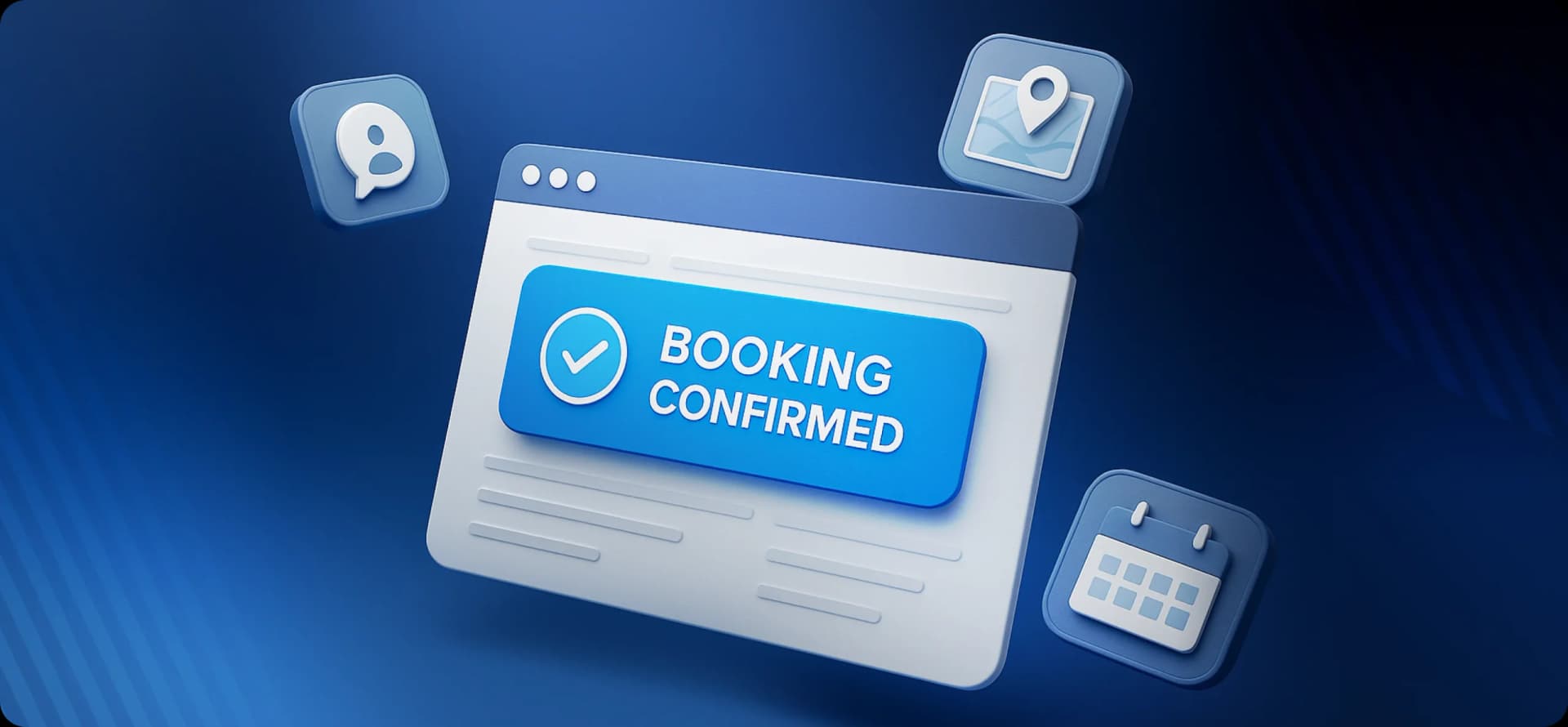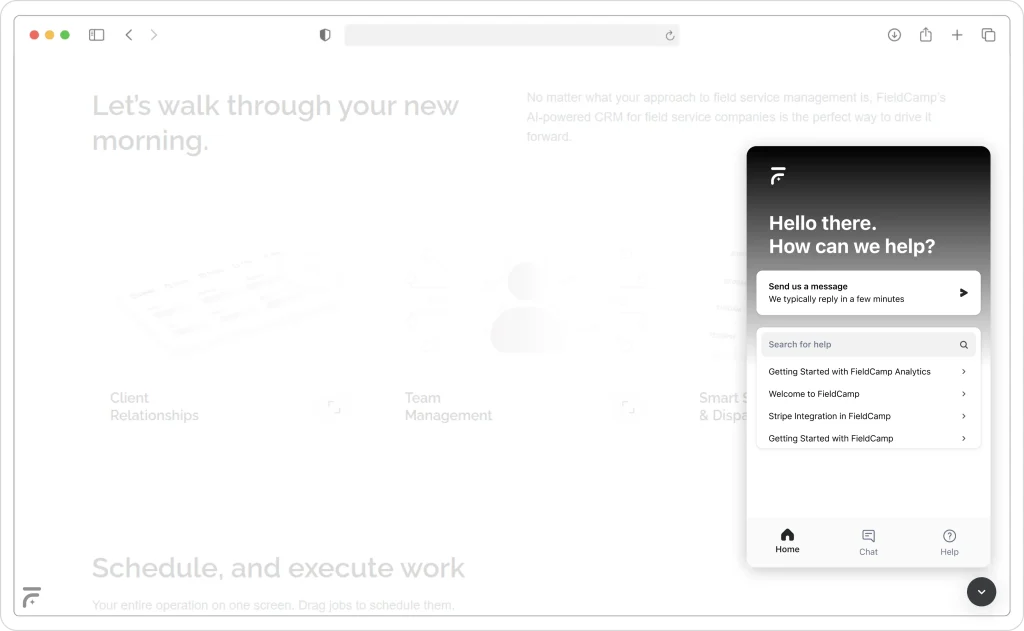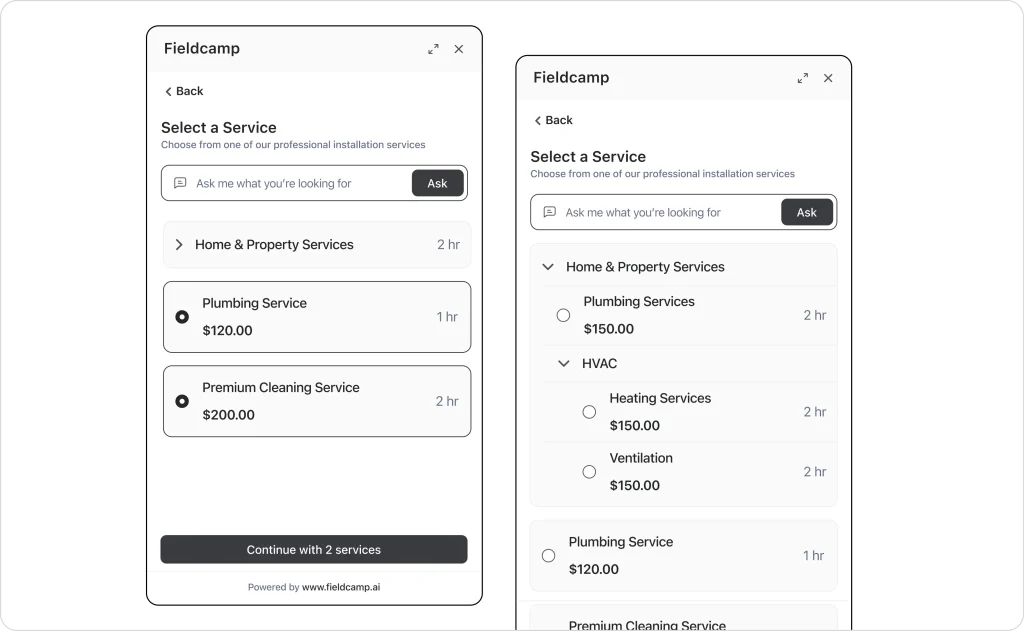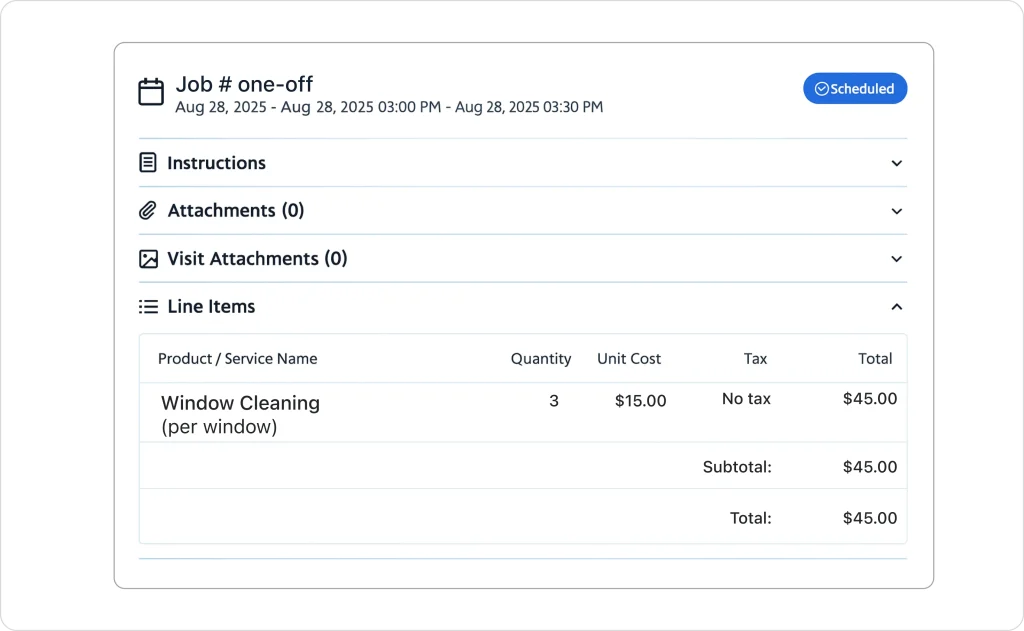What is Online Booking System: A Complete Guide for Field Service Businesses
September 2, 2025 - 15 min read

September 2, 2025 - 15 min read

Table of Contents
| TL;DR An online booking system is your 24/7 digital receptionist; capturing jobs, reducing admin work, and delivering smoother customer experiences. For field service businesses, it’s the fastest way to grow with less effort. |
Quick Answer
An online booking system is a digital scheduling platform that allows customers to book appointments with your field service business through your website or mobile app 24/7, without any human interaction. For field service businesses, it automates the entire process from customer booking, job record to technician assignment, payment processing, and notifying technician and clients both.
Let’s get started.
McDonald’s didn’t become a global empire by making the world’s best burgers. They succeeded by making ordering effortless, predictable, and fast. The same principle applies to field services: customers don’t just want quality work – they want frictionless booking. The electrician who can be hired in 30 seconds online will beat the one requiring a phone tag marathon every single time.
Here’s the reality: 73% of customers now start their search for services online, and 67% prefer scheduling appointments digitally over calling. That means if your booking process isn’t online, you’re invisible to most of today’s buyers.
That’s exactly the reason why we’ve created this comprehensive guide to online booking systems for field service businesses. You’ll discover what online booking really means for contractors, how it can transform your operations, and which core components matter most.
KEY HIGHLIGHTS
All About Online Booking System
An online booking system is a digital scheduling platform that allows customers to book appointments with your business through your website, social media, or mobile app—without any human interaction. Think of it as your 24/7 virtual receptionist that never takes a break, never calls in sick, and never puts customers on hold.

For field service businesses specifically, an online booking system goes beyond simple calendar slots. It’s an intelligent scheduling solution that considers:
Unlike generic appointment scheduling software designed for salons or restaurants, field service booking systems understand that you can’t teleport between jobs and that a water heater installation takes longer than an oil change.
Every professional online booking platform includes these essential elements:
Capture Jobs Before Competitors Do
Customers book 24/7, so don’t limit your business to office hours. FieldCamp confirms availability instantly, books the slot, and assigns your best tech—so you win business in seconds.
Understanding the mechanics of online appointment booking helps you maximize its benefits. Here’s the typical workflow for a field service business:
Whether through your website, Google Business Profile, or social media, customers find your online scheduling portal. Smart systems like FieldCamp can embed booking widgets anywhere your customers are looking.

Customers choose from your service menu—perhaps “AC Repair,” “Annual Maintenance,” or “New Installation.” The system can ask qualifying questions: “What type of unit?” “Residential or commercial?” This information helps you prepare and price accurately.

Stop Wasting Time on Out-of-Zone Jobs
FieldCamp automatically checks every address against your pre-set service areas. Only profitable, in-range jobs make it through—no wasted trips, no extra fuel loss, no lost hours.
The system shows available time slots based on:

Once booked, customers receive immediate confirmation with:
Meanwhile, your team gets notified through their preferred channel—app notification, SMS, or email.

The system sends strategic reminders:
The benefits of implementing an online booking system extend far beyond convenience. Here’s what changes when you embrace digital scheduling:
Studies show that 40% of service requests come outside business hours. Without online booking, you’re literally turning away money. Consider these scenarios:
A typical 5-technician HVAC company handles 30-50 scheduling calls daily. Each call averages 7 minutes:
That’s nearly 6 hours daily just managing appointments. An online booking platform handles this automatically, freeing your staff for revenue-generating activities like upselling maintenance contracts or following up on quotes.
Manual scheduling inevitably leads to:
Online scheduling software eliminates these costly mistakes through automated validation and real-time calendar synchronization.
Modern customers expect digital convenience. They order groceries online, bank from their phones, and stream entertainment on-demand. Why should booking a plumber be different?
Online appointment scheduling delivers:
Happy customers book more services, leave better reviews, and refer more business.
Every online booking generates valuable data:
This intelligence guides strategic decisions about staffing, service area expansion, and marketing investments.
Most online booking tools stop at putting a calendar on your website. FieldCamp goes much further—it turns every booking into a fully managed job inside your system.
Here’s what makes it stand out:
Every confirmed booking instantly becomes a job record in FieldCamp. Customer details, service type, and costs are captured—no manual typing, no missed info.
Jobs don’t just sit on a calendar—they’re assigned automatically based on skill set, location, and availability. That means the right tech gets the right job every time.
The system checks addresses against your pre-set service zones. Only profitable, in-range jobs make it through—saving wasted trips and unnecessary costs.
Collect deposits or full payments during booking with Stripe. Payments link directly to jobs, reducing no-shows and improving cash flow.
Customers see only real-time availability, get instant confirmations, and even receive automated emails or payment receipts. To them, it feels like a 24/7 receptionist who never misses a call.
Both customers and technicians are kept in the loop with instant email and app notifications—so everyone knows exactly when, where, and what’s happening.
Let customers schedule jobs however they prefer—either separately across multiple time slots or bundled together in a single visit. The system adapts automatically.
FieldCamp comes with a built-in live chat widget and AI assistant to answer customer questions, check availability, and even guide them through booking—all without tying up your staff.
24/7 Booking That Never Sleeps
With FieldCamp, bookings stay open around the clock, Jobs get booked by themselves. Late-night emergencies, weekend repairs, or lunchtime requests turn into revenue without your team lifting a finger.
Let’s address the elephants in the room—concerns that keep field service businesses from embracing digital scheduling:
Some do, and they still can. Online booking supplements, not replaces, phone scheduling. But consider: younger customers increasingly avoid phone calls entirely. By 2025, millennials will represent 75% of the workforce—and your customer base.
Modern booking platforms are designed for simplicity. If your technicians can use smartphones, they can use scheduling software. Plus, automation reduces complexity—no more juggling paper calendars and whiteboards.
Actually, small businesses benefit most from automation. You don’t have dedicated scheduling staff, so freeing up time is even more valuable. Many platforms offer affordable starter plans specifically for small operations.
The opposite is true. When customers can book instantly and you arrive on time with their service history at hand, that’s exceptional personal service. Technology enables better human connections, not replaces them.
How do you know if your online scheduling investment is paying off? Track these key performance indicators:
The question isn’t whether your field service business needs an online booking system—it’s how quickly you can implement one before losing more revenue to competitors who already have.
Every day without online scheduling means missed opportunities: the 2 AM emergency call you didn’t receive, the busy professional who couldn’t wait on hold, the repeat customer who booked someone else because it was easier.
Take the first step today. Research platforms designed for your industry. Request demos. Start free trials. Your future self—and your customers—will thank you.
Ready to transform your field service scheduling? Explore how FieldCamp’s intelligent online booking system can help you capture more revenue, reduce administrative burden, and deliver exceptional customer experiences. Start your free trial today and join thousands of service businesses already growing with automated scheduling.
Basic systems start around $99-149 monthly for small field service businesses (1-3 technicians). Professional platforms like FieldCamp range from $99-299 monthly, including features like route optimization and payment processing. Most businesses recover costs within 2-3 weeks through time savings alone.
Yes, modern systems excel at emergency scheduling. They automatically prioritize urgent requests, notify available technicians instantly, and can charge emergency surcharges. FieldCamp sends push notifications to nearby technicians for fastest response times.
Professional platforms integrate with popular business tools including QuickBooks for accounting, Google Calendar for scheduling, Stripe for payments, and various CRM systems. FieldCamp offers pre-built integrations with 50+ business applications.
Real-time calendar synchronization prevents conflicts by instantly updating availability across all channels when appointments are made. The system considers travel time, job duration, and buffer time between appointments—more reliable than manual scheduling.
Customers can reschedule or cancel through the same online portal, subject to your policies. The system automatically opens time slots for other bookings and can notify waiting list customers. This self-service approach reduces phone calls by 60-70%.